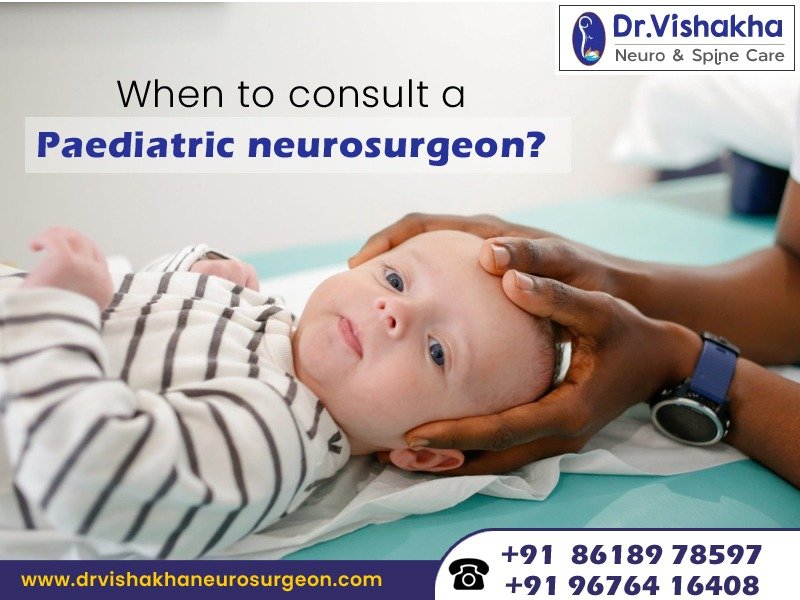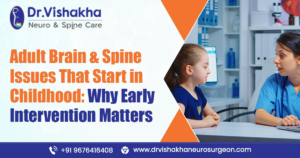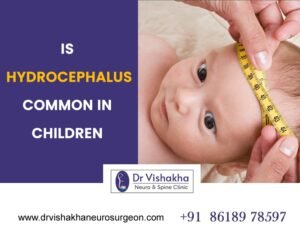Dr Vishakha – Senior consultant paediatric neurosurgeon

A paediatric neurosurgeon is responsible for diagnosing, treating, and managing neurosurgical disorders in infants, children, and adolescents. They specialise in the brain, spine, or nervous system and oversee both surgical and non-surgical aspects of care.
Primary reasons for contacting a paediatric neurosurgeon:
- Any swelling on the back of a baby or on the back of head, any tags or tuft of hair on the back – suggestive of neural tube defects / spina bifida
- Increasing head size of the head – might suggest hydrocephalus
- Abnormal shape of head – suggestive of positional plagiocephaly or craniosynostosis
- Cough headache with or without weakness in limbs and walking difficulties – might suggest Arnold chiari malformation
- Headache with vomiting , weakness on face or limbs , walking difficulty , vision disturbances or hormonal imbalances – may raise the suspicion of a brain tumor.
- Congenital brain and spine conditions:
Congenital brain and spine conditions, which can cause subtle or immediate symptoms, are present at birth and early recognition is crucial for timely diagnosis and intervention.
- Brain and spinal cord tumours:
Brain and spinal cord tumours may necessitate surgical removal or biopsy, depending on their benign or malignant nature.
- Traumatic brain and spinal injuries:
Severe head trauma, resulting in skull fractures, brain bleeding, or swelling, may necessitate surgery, while spinal cord injuries may require stabilisation or decompression.
- Epilepsy and seizure disorders:
Intractable seizures that don’t respond to medication may be considered for surgical options like resection of the epileptic focus or vagus nerve stimulation.
- Cerebrovascular disorders:
Arteriovenous Malformations (AVMs) are abnormal blood vessel tangles in the brain or spine, while aneurysms are weak spots in blood vessels that can rupture.
- Infections and inflammatory conditions:
Brain abscesses, filled with pus, may necessitate surgical drainage, while spinal infections, like epidural abscesses, may require intervention to prevent further damage.
- Neurodevelopmental disorders:
Tethered Spinal Cord is an abnormally attached spinal cord that may require surgical release, while Cerebral Palsy may require surgical intervention to manage spasticity or correct orthopaedic deformities.
- Hydrocephalus and increased intracranial pressure:
Children with hydrocephalus frequently require the insertion or revision of a surgical shunt to drain excess fluid. At the same time, neurosurgeons may need to monitor and manage intracranial pressure levels due to conditions causing increased pressure.
- Spinal deformities:
Scoliosis is a severe spinal curvature that may necessitate surgical correction, while kyphosis is an abnormal forward spine curvature that may also necessitate surgical intervention.
- Persistent or worsening neurological symptoms:
Severe headaches, developmental delays, and motor and sensory deficits are:
- Signs of neurological issues requiring surgical evaluation.
- Suggesting structural brain abnormalities that may require neurosurgeon intervention and weakness.
- Paralysis.
- Sensory loss.
- Spasticity and movement disorders:
Selective Dorsal Rhizotomy is a surgical procedure used to alleviate spasticity in children with cerebral palsy. In contrast, Deep Brain Stimulation may be used to manage movement disorders that don’t respond to other treatments.
A paediatric neurosurgeon is a specialist who diagnoses, treats and manages complex brain, spine, or nervous system conditions in children, ensuring they can effectively manage these critical conditions during surgical intervention.
Critical responsibilities of a Paediatric surgeon:

A paediatric neurosurgeon diagnoses, treats, and manages neurological conditions in infants, children, and adolescents, encompassing both surgical and non-surgical aspects of care.
- Diagnosis and evaluation: Paediatric neurosurgeons conduct comprehensive assessments of children with neurological symptoms, including physical exams, neurological tests, and imaging studies. They diagnose a variety of conditions affecting the brain, spine, and nervous system, including congenital abnormalities, tumours, traumatic injuries, and developmental disorders.
- Surgical intervention: Paediatric neurosurgeons perform complex brain, spine, and peripheral nerve surgeries, including tumour removal, congenital malformation correction, traumatic injury treatment, and managing conditions like epilepsy or hydrocephalus. They plan and prepare for surgeries, review diagnostic images, determine the best approach, and discuss risks and benefits with the patient’s family. Postoperatively, they oversee recovery, manage pain, monitor complications, and recommend rehabilitation therapies.

- Management of chronic conditions: Paediatric neurosurgeons manage chronic neurological conditions like hydrocephalus, spina bifida, and cerebral palsy, ensuring ongoing treatment and monitoring of the child’s condition. They collaborate with a multidisciplinary team, including paediatricians, neurologists, oncologists, and rehabilitation specialists, to provide comprehensive care for the child.
- Emergency care: Paediatric neurosurgeons are responsible for emergency treatment of severe head or spinal injuries, performing life-saving surgeries to relieve brain pressure or stabilise the spine. They also handle acute neurological conditions like brain haemorrhages, strokes, or infections that require immediate surgical intervention.
- Patient and family education: Paediatric neurosurgeons educate patients and their families about their child’s condition, treatment options, surgical procedures, and expected outcomes, helping them make informed decisions about their child’s care. They also provide emotional support to families facing complex diagnoses and treatment decisions with compassion.
A paediatric neurosurgeon is a vital specialist in treating children with neurological conditions. They provide both surgical expertise and compassionate, long-term care. They can provide specialised care and determine the best course of action, whether surgical or non-surgical. If unsure, it’s advisable to consult a paediatrician or paediatric neurologist for a referral.
About Dr Vishakha Karpe :
Dr. Vishakha Karpe, a highly skilled Senior Paediatric Neurosurgeon at Rainbow Children’s Hospital, Banjara Hills, and Hyder Nagar in Hyderabad, is one of India’s leading paediatric neurosurgeons with extensive experience in paediatric neurosurgery. With over ten years of dedicated practice, she is among the few in India working extensively and exclusively in this field. She has a keen interest in craniosynostosis surgery.
She focuses on comprehensive care, including precise surgery and educating parents about the complete case management protocol.
Proficiency of Dr Vishakha:
Hydrocephalus (increased fluid in the brain): The procedure involves an endoscopic third ventriculostomy and CSF diversion (VP shunt) to treat complex hydrocephalus.
- Craniosynostosis (abnormal head shape due to untimely cranial sutures fusion) surgeries: Helmet therapy is a technique that is used in both endoscopic and open surgery.
- Spinal dysraphisms(Spina Bifida)- (spinal abnormalities present by birth) – surgical repair
- Encepahaocles repair surgery.
- Vascular conditions and stroke surgeries: revascularization surgeries for moya moya disease.
- Paediatric brain and spine tumour surgeries.
- Paediatric brain and spine infection surgeries: Endoscopic and open surgeries for brain and spine infections.
- Paediatric traumatic brain and spinal injury.
- Antenatal counselling for congenital fatal neurosurgical conditions.





